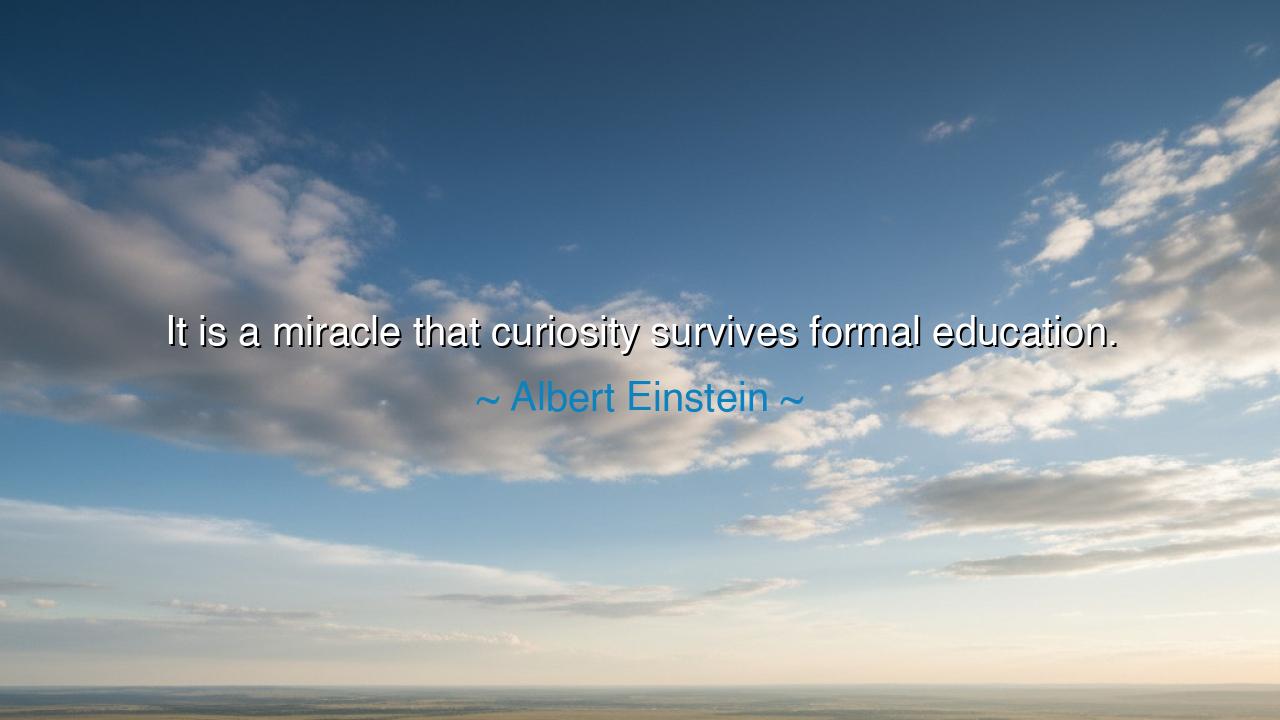
It is a miracle that curiosity survives formal education.






"It is a miracle that curiosity survives formal education." So spoke Albert Einstein, the great mind who peered into the mysteries of the cosmos and saw beyond the visible stars into the fabric of creation itself. These words, simple yet piercing, contain within them both wonder and sorrow. For they praise the resilience of the human spirit—the miracle of curiosity—while lamenting the systems that too often stifle it. In Einstein’s voice, one hears the echo of countless thinkers who have walked the path of learning, only to find that the flame of discovery is dimmed by the weight of conformity.
To understand this quote, one must look not to the walls of a classroom, but to the nature of curiosity itself. It is the sacred fire of the mind—the impulse to question, to explore, to uncover what lies hidden. Every child is born with it, bright and untamed. Yet as they grow, they are trained to obey rather than inquire, to memorize rather than to imagine. Einstein himself, though later hailed as a genius, often felt confined within the rigid structure of traditional schooling in Germany. He found no joy in rote learning, no life in examinations. It was only outside those walls—reading alone, thinking deeply, wandering in thought—that his true education began. Thus, his quote stands as both a confession and a warning: that formal education, if not tempered by wonder, risks killing the very curiosity that gives learning its soul.
In ancient times, the great teachers understood this truth. Socrates, walking the streets of Athens, taught not by lecturing but by asking questions. He did not demand blind acceptance, but invited his students to wrestle with truth themselves. Confucius, too, believed that the essence of education was not the transmission of facts, but the cultivation of virtue and reflection. These sages knew that the human mind blossoms only when it is free to question. They would have understood Einstein’s lament perfectly—that too much schooling seeks obedience, not enlightenment; repetition, not revelation.
Consider the story of Galileo Galilei, the father of modern science. His curiosity was his greatest gift—and his greatest crime. When he dared to look through his telescope and declare that the Earth moved around the Sun, he defied not only the Church but the entire structure of formal knowledge of his day. His discovery was born not from schooling, but from rebellion against it. He, like Einstein centuries later, proved that curiosity is the lifeblood of progress, and that institutions, left unchecked, will always prefer the comfort of tradition to the danger of discovery.
Einstein’s words, however, are not merely criticism—they are also a hymn of hope. He calls it a miracle that curiosity survives, for despite all the pressures to conform, the flame endures. Somewhere in every classroom sits a child whose imagination refuses to die, whose mind drifts beyond the blackboard into worlds unseen. It is this spirit, untamable and divine, that carries humanity forward. It built the pyramids, painted the Sistine Chapel, split the atom, and sent ships beyond the stars. No system, however rigid, can extinguish the human hunger to know.
And yet, Einstein’s quote is also a challenge to every generation. It calls upon teachers, parents, and leaders to become guardians of curiosity rather than its destroyers. Education must not be a cage but a garden—a place where questions are planted, not silenced. Knowledge imposed without wonder becomes tyranny of the mind; but knowledge awakened by curiosity becomes wisdom. The true teacher does not fill a vessel, but lights a torch. The true student does not repeat words, but seeks meaning.
Let this be the lesson drawn from Einstein’s lament: cherish your curiosity, for it is the voice of your soul calling you toward truth. Never let systems, rules, or fear silence it. Read not because you must, but because you hunger to know. Ask questions that disturb complacency. Wander, ponder, experiment, fail, and try again. For curiosity is the origin of genius, and as long as it survives, so too does the spirit of humanity. In this way, Einstein’s miracle continues—not as a relic of the past, but as a living flame that each of us must guard, so that the light of wonder may never fade from the world.






AAdministratorAdministrator
Welcome, honored guests. Please leave a comment, we will respond soon